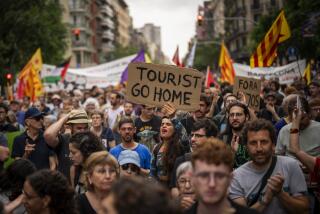Scat, Smelly Crusties! Bathonians Say
BATH, England — The unwashed are unwelcome in Bath.
Citizens fear the influx of “new-age travelers,” a hippie-like youth culture, is soiling the image of a city famed for Roman baths and gracious 18th-Century architecture.
“Crusties” is the local pejorative for the travelers, who smell bad and hover around the baths and abbey, pestering tourists for change. The effect on tourists is a worry because Bath counts on 2 million a year.
A lanky 26-year-old named Luke in black army boots, tattered jeans and a Carlsberg Special Brew T-shirt feels his crowd is a boon for Bath.
“I think we’re as much of a tourist attraction as anything else,” he said. “I’ve been on video three times.”
His view finds little support among residents.
“Bath has become a magnet for them, and it’s very sad because it’s spoiling the beauty of the city and the enjoyment for the visitors,” said Caron Cooper, owner of the Fosse Farm House Country Hotel, 10 miles outside the city.
Police do their best to stay neutral. As Inspector Nicholas Lemoir explained:
“It is not against the law of this land to be unattractive, untidy or unclean. People that ask us not to let them congregate are asking us to act outside of our power.”
The travelers--they consider that the least offensive label--admit to washing infrequently, but claim to be misunderstood.
They say they are passive unless riled by locals who poke fun or throw them out of pubs, they say, and envision themselves as part of Bath’s charm.
Because of several anti-Crustie articles in the local press, they tend to be wary of reporters.
After hours of sharing a bench outside the abbey, however, they warmed to a recent visitor and invited her to spend the night in a dilapidated van. There was even an offer of some rotting chocolate pudding scavenged from a garbage bin behind a grocery store.
Travelers range far beyond Bath. Stonehenge used to be the great gathering place, but police now turn out in force just before the summer solstice to keep them away.
In May, swarms of travelers took over Castlemorton Common in western England. In August, several thousand turned up at Newton in Wales, moving on after civil servants visited their camp to expedite distribution of welfare checks.
That gesture caused much harrumphing in the national press. Auberon Waugh, a Daily Telegraph columnist, complained that the travelers “are pursued wherever they go by mobile Social Security units anxious to keep them supplied with 10-pound notes for such essentials as strong lager and tobacco.”
Some travelers come to the lifestyle by choice. Others say they have been abandoned by their parents and have nowhere else to turn.
Michael, 19, said he was thrown out of school and home four years ago and likes the life of a traveler.
“No worries at all,” he said. “If you get a job, you just have worries.”
“I’m not gonna pay taxes to a corrupt government,” said Mark, 23. “It’s a simple life that doesn’t harm the environment.”
Geoffrey Pearson, a University of London sociologist who has studied youth cultures, said the travelers have “affinities with the hippies, such as being against material values and embracing an alternative lifestyle.”
Unlike hippies, who were identified with opposition to the Vietnam War and the arms race, the travelers disavow any philosophy.
Some of their weekend jamborees in rural towns have attracted more than 20,000 participants, but most of the party-goers are thought to be wanna-bes, not real camper-dwellers.
Travelers say they just want to be left alone. Most Bathonians wish the travelers would leave Bath alone.
More than 90% of the respondents to a survey by the The Evening Chronicle, Bath’s newspaper, said they wanted the travelers to go away. Some residents suggested encouraging tourists to “starve them out of town” by refusing donations.
“Where does one put them?” asked David Power, who lives 60 miles away, but visits frequently. “We can’t send them to Australia like we used to.”
More to Read
Sign up for The Wild
We’ll help you find the best places to hike, bike and run, as well as the perfect silent spots for meditation and yoga.
You may occasionally receive promotional content from the Los Angeles Times.




